Key takeaways:
- Nightclub music venues serve as cultural hubs, fostering communities around shared musical tastes and providing platforms for emerging artists.
- Avant-garde music challenges traditional norms, encouraging experimentation and emotional exploration, often blurring the lines between music and other art forms.
- Memorable performances at these venues create profound connections among audiences, transforming them from spectators into active participants in the musical experience.
- To enjoy avant-garde music, approach it with an open mind and embrace unpredictability while considering the venue’s atmosphere for an immersive experience.
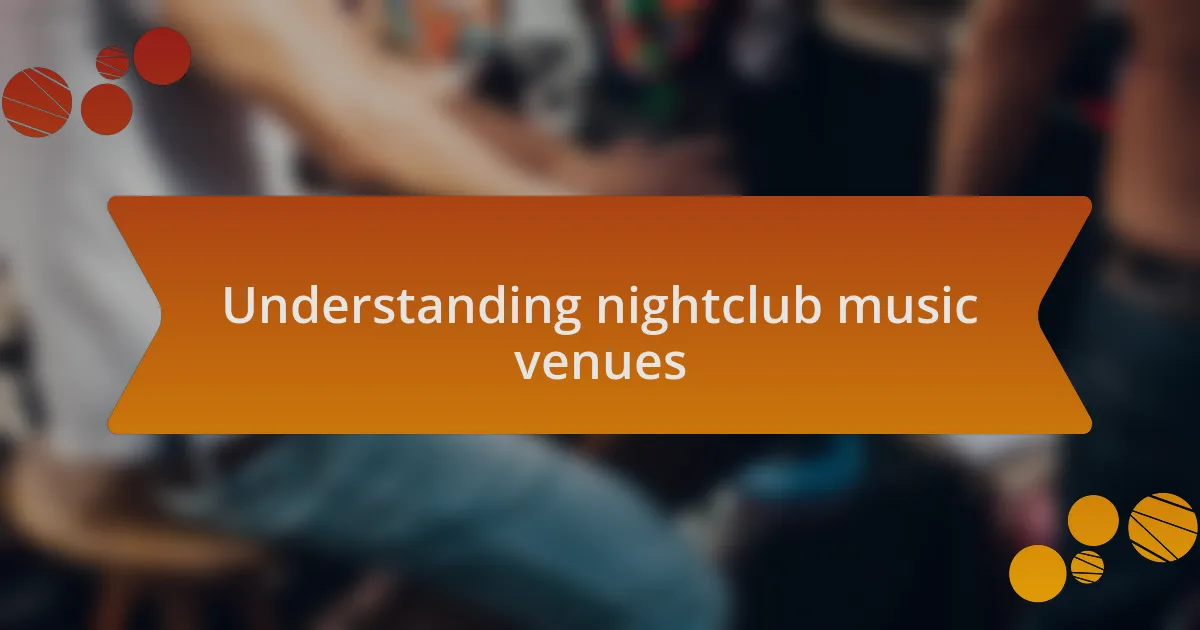
Understanding nightclub music venues
Nightclub music venues are fascinating spaces where creativity and nightlife converge. I often find myself drawn to the unique energy they possess, as the atmosphere transforms with each DJ or live act. Have you ever walked into a club and felt the bass pulsating through your body? It’s an experience that connects you to the music in a visceral way.
In my explorations, I’ve discovered that these venues can vary widely in size and style, from intimate rooms with a few hundred people to sprawling clubs that host thousands. I remember one unforgettable night in a small venue where the DJ played an unexpected blend of classic house and avant-garde sounds, creating a sonic journey that kept everyone on the dance floor until the early hours. It’s moments like these that remind me of the profound impact a space can have on the music experience.
Understanding the essence of nightclub music venues requires recognizing their role as cultural hubs. They not only showcase emerging artists but also create communities around shared musical tastes. When was the last time you encountered a profound connection with someone over a track played in a dimly lit room? For me, that sense of belonging is what keeps me coming back to these vibrant spaces, eager to explore new sounds and meet fellow music enthusiasts.
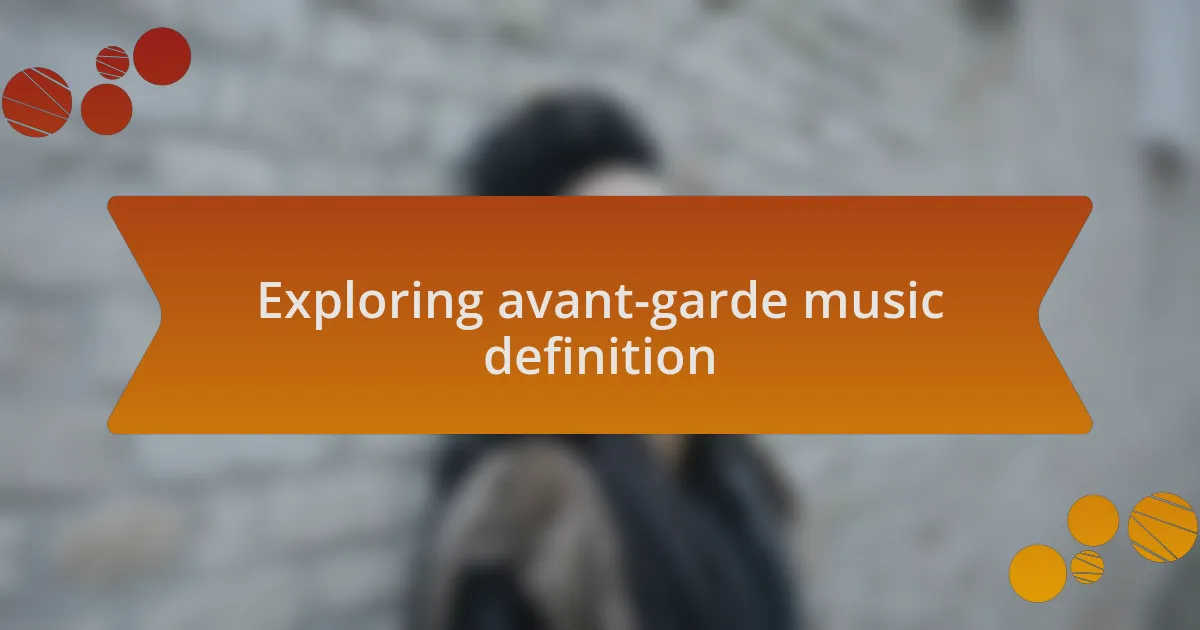
Exploring avant-garde music definition
Avant-garde music is best understood as a genre that pushes boundaries, challenging conventional norms and aesthetics. I often think of it as a sonic playground where composers and artists experiment freely. Have you ever listened to a piece that felt entirely new, defying your expectations? That’s the essence of avant-garde music—its ability to evoke strong emotions while inviting an exploration of sound itself.
When I first encountered avant-garde music, it was through an unexpected performance at a local nightclub. The artist utilized unconventional instruments and methods, constructing a soundscape that was both jarring and beautiful. I remember feeling perplexed yet fascinated, as each note and silence drew me deeper into the experience, prompting me to question what music could truly be.
This genre isn’t just about sound; it’s about expression and individualism. Avant-garde artists often explore themes that resonate on a personal level, reflecting their thoughts and emotions. I’ve found that immersing myself in this music can spark profound reflections within me, making me wonder how creativity can break through barriers we often set for ourselves. How can sound become a medium for introspection and societal commentary? It’s a compelling inquiry that avant-garde music continuously evokes in its listeners.
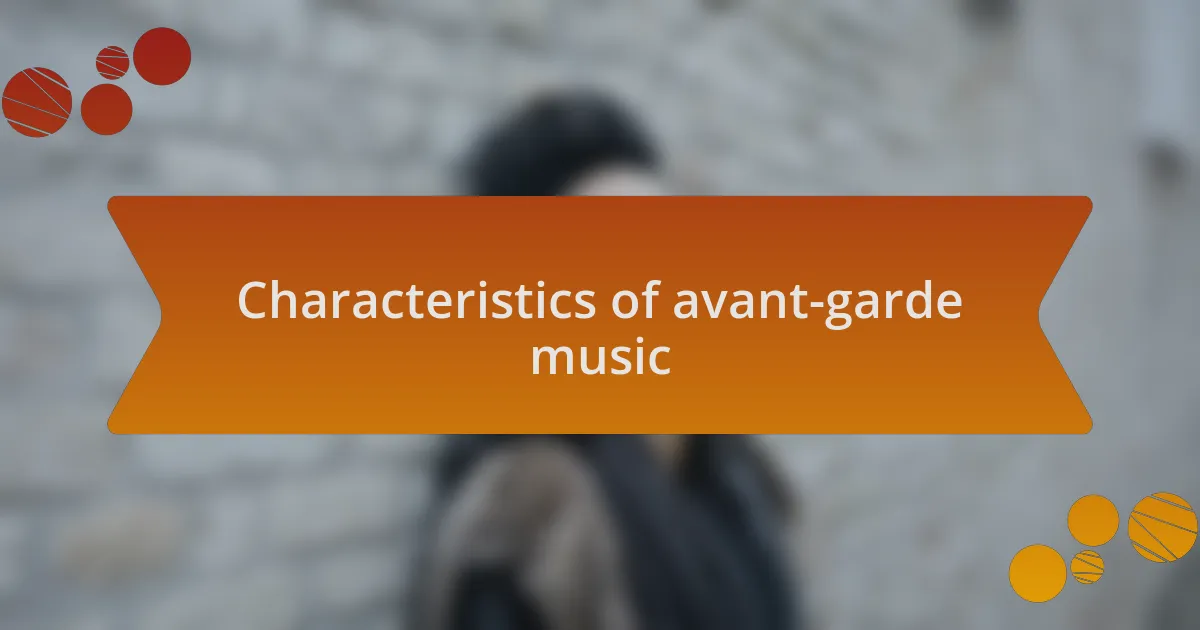
Characteristics of avant-garde music
Avant-garde music often defies traditional structures, embracing spontaneity and unpredictability. I vividly recall attending a performance where the artist employed improvisation, creating a raw and chaotic atmosphere. It made me realize how liberating it can be to let go of musical conventions and immerse yourself in a moment of raw sound. Have you ever felt that thrill of unpredictability in music?
Another characteristic that stands out to me is the incorporation of non-traditional instruments and technology. In one memorable experience, I encountered a setup involving found objects as percussion instruments. The resulting sounds were haunting yet enchanting, prompting me to reflect on the idea that anything can be a medium for musical expression. Isn’t it fascinating how innovation can reshape our understanding of music?
Avant-garde pieces frequently challenge listeners by blurring the line between music and other art forms. I experienced this firsthand during an installation that combined visual art and sound, where the absence of melody pushed me to focus on texture and rhythm. This interaction highlighted how avant-garde music can serve as a multi-sensory journey, making me ponder, how does this cross-disciplinary approach deepen our appreciation for all forms of art?
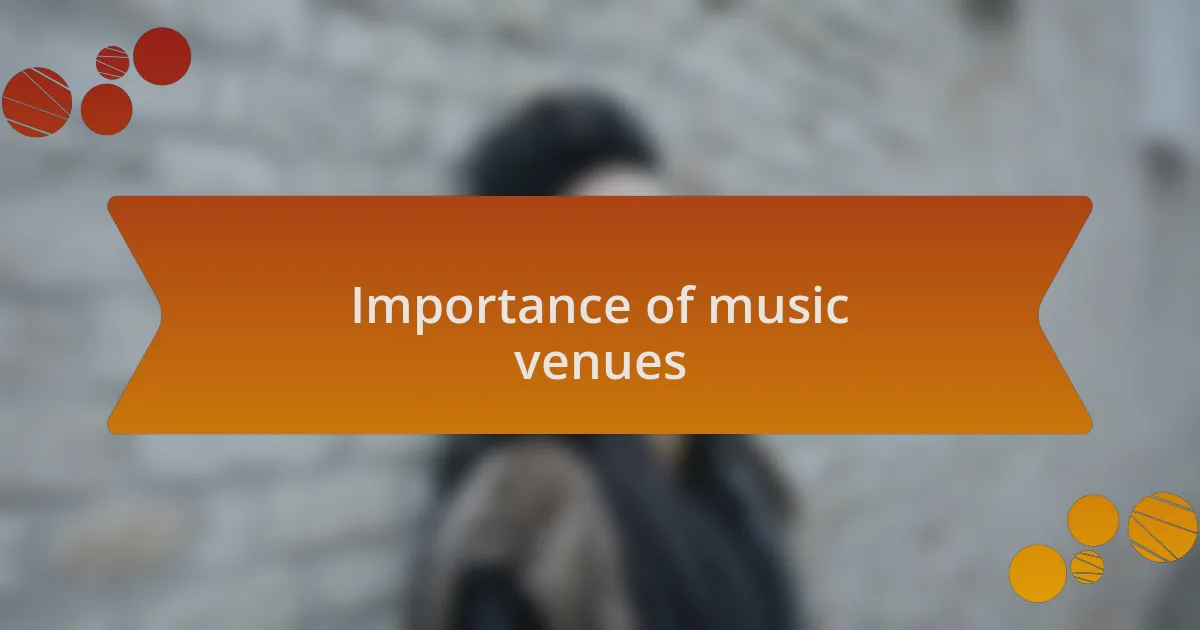
Importance of music venues
Music venues are essential hubs for creativity and community, acting as the lifeblood of diverse musical expressions. I remember stepping into an underground space with peeling walls, where the air buzzed with anticipation before a performance, and I felt an immediate connection to the artists and fellow attendees. Isn’t it incredible how a physical space can transcend its four walls and foster a sense of belonging among strangers?
These venues provide a platform for experimental and avant-garde musicians to showcase their innovative works, often without the constraints found in mainstream environments. One evening, I attended a set that turned the venue itself into part of the performance; the musicians engaged with the space in unexpected ways, drawing the audience into a collective experience that felt truly transformative. Have you ever been swept away by the sheer power of a live performance, feeling that you’re not just a spectator but an integral part of the unfolding story?
Moreover, these music venues serve as crucibles for emerging talent, nurturing the next generation of artists. I recall a small club where I first encountered an artist who would later break into the mainstream. Watching their journey from intimate gigs to larger stages reminded me of the vital role venues play in shaping musical landscapes. Isn’t it amazing to think that every big star once honed their craft in a space just like this?
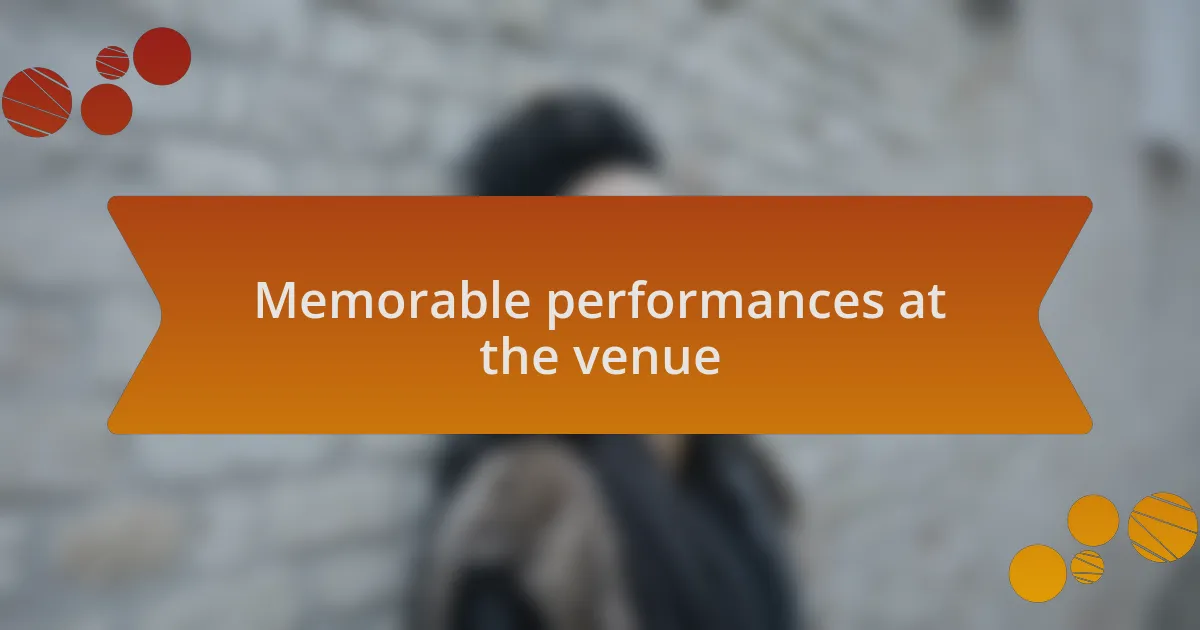
Memorable performances at the venue
During a particularly unforgettable night at the venue, I witnessed a performance that blurred the lines between sound and visual art. The artist, surrounded by an array of unconventional instruments, created a soundscape that resonated deeply within me. I couldn’t help but wonder how such inventive artistry could evoke such raw emotion in a simple room filled with strangers.
One standout moment was when a local collective took the stage with their unique blend of live coding and improvisation. As the music unfolded, I felt the energy in the room shift; it was as if we were all part of a collaborative experiment in sound. Isn’t it fascinating how avant-garde performances can foster connections among the audience, turning us from mere observers into participants in a shared journey?
There was also a night when a surprise guest—an avant-garde icon—showed up unexpectedly, sending chills down my spine. The electrifying atmosphere was palpable, as we all shared glances that said, “We’re witnessing something special.” How often does one get to experience a legend in such an intimate setting? Moments like these reaffirm the venue’s role as a sanctuary for artistic expression, where every performance leaves a lingering imprint on the soul.

Tips for enjoying avant-garde music
To truly enjoy avant-garde music, it helps to let go of traditional expectations. I remember my first encounter with an experimental artist who challenged the very definition of music—nothing was in tune, yet I felt a sense of rhythm that was grounding. Embrace the chaos; you might find beauty where you least expect it.
Attending with an open mind can transform your experience. I often chat with fellow audience members during breaks, sharing thoughts on the pieces we’ve just witnessed. It’s surprising how differently people interpret the same performance—one person’s noise can be another’s profound moment of clarity. Have you ever found yourself inspired by an unexpected conversation?
Finally, consider the venue’s atmosphere. I recall a night when the dim lighting and undefined space created an immersive experience, almost like stepping into another world. The environment can heighten the emotional impact of the performance, so seek out venues that cultivate that unique ambiance. What kinds of settings resonate most with you during such performances?